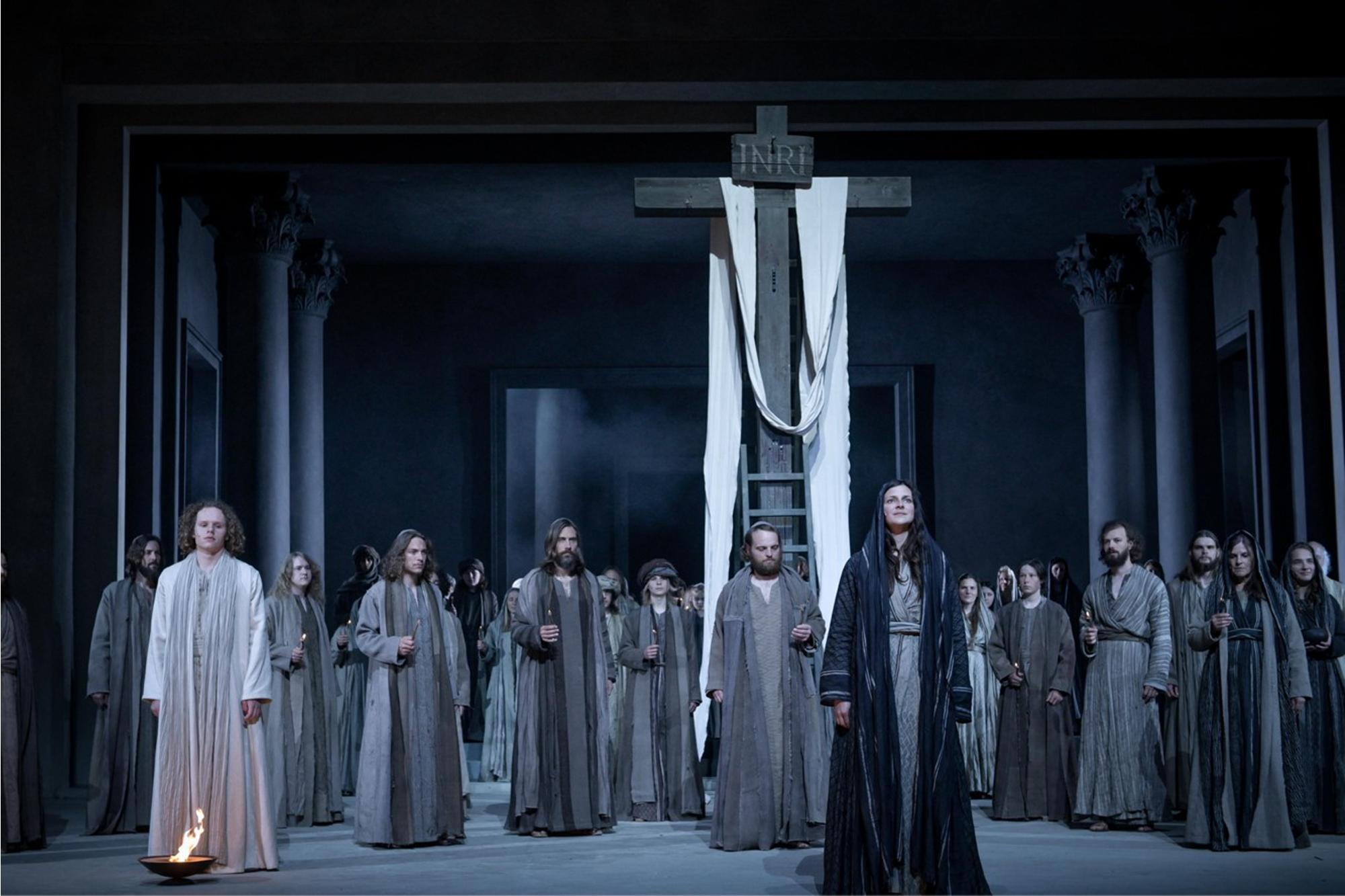
The Theatre Backpacker
OBERAMMERGAU PASSIONSSPIELE: EXPLORING A SACRED THEATRE 6
By Jack Paterson | Part 6 of 10
DATE: April 2022
Location: Oberammergau, Germany
Activity: Observing Rehearsals
It’s 6 PM.
On Stage. The Marketplace. Judas is angry at Jesus’s lack of political action. Roman soldiers. Jesus bound. Silver. Judas runs.
The costumes are gorgeous. This is a contemporary design drawing from across history. Early in the production, the soldiers breast plates, helmets, swords, and spears suggest the 1600s and the period of the play’s origin. The temple priests are draped in beautiful colored robes with the younger men in all white.
Like any “work through”, not everything goes to plan. Cues are missed and lines are dropped. A roman guard very helpfully picks up the hat of a man he is supposed to be beating to the laughter of everyone involved. A mis-cued preshow announcement interrupting the choir over the speakers. We stop while as someone and something is located. I pull up my mask as the wind blows through the theatre. I make a mental note to wear everything I brought with me tomorrow night.
What ever the problem is – it is solved. The actors complete their scene, the choir re-enters and the next living tableau is revealed.
***
I am not a believer, but even I know this next story.
Judas enters. Even though in German, I understand the story the actor is trying to tell – a man grappling with his guilt. Upstage hangs the noose.
Widely considered the best part, this year Judas is played this year by 22-year-old actor Cengiz Görür. Like all the lead roles, he rotates the part with another local performer Martin Schuster. Görür is the first actor of Muslim faith to play a leading part in the production. Finding his vocation through Stückl, he began acting with smaller roles at the Oberammergau Festival Theater in the ten years between the Passions. When he started his professional acting training in Munich. Stückl promised him a part that would “snap his ears”.
“I want to show his inner turmoil, the despair,” he said of Judas in a pre-pandemic press interview. And he does. Despite my language barrier, I feel his every moment. I want to stand up and applauded at the end of the scene.
When Stückl first took over as director, performers had to of one of the two major German churches – Roman Catholic or Lutheran. These would not be the only traditional limitations to participation. One of Stückl’s early controversies was casting married mother, Elisabeth Petre, as Mary. At that time, only unmarried women under the age of 35 were allowed to participate. A protestant spoke the prologue for the first time, causing even further controversy in the community.
As the Passionsspiele evolves to meet the contemporary needs and realities of Oberammergau, those who have left the church, atheists, and members of any other religious affiliations can participate as long as they are residents. This year the children of recent refugees were invited to join to the performance.
“There’s still more to be done,” says a woman I speak to. The leading roles are all male, except for Jesus’ mother, Mary, and Mary Magdalene. And to quote the rebel director, “To bring the play to the next generation, you have to bring it to your time.”
Oberammergau Passionsspiele: Exploring a Sacred Theatre – Part 4
Oberammergau Passionsspiele: Exploring a Sacred Theatre – Part 5


Jack (he, him) is an award-winning devisor, director, translator, and creative producer whose work and practice have taken him across Canada, Europe, the United Kingdom, and around the world. Projects have ranged from contemporary devising, multi-disciplinary, cross-cultural, and multi-lingual experiences to new works & texts, contemporary approaches to classical theatre and main stages. Shows under his direction have garnered over thirty theatre award nominations with many wins. He trained at leading international theatrical institutions including Circle in the Square (NYC, USA), GITIS The University of Performing Arts (Moscow, RU), ISI Indonesian Institute of the Arts (Bali, INA) and received his Masters in Fine Arts from the renown East 15 Acting School and University of Essex (London, UK).
Read Full Profile© 2021 TheatreArtLife. All rights reserved.

Thank you so much for reading, but you have now reached your free article limit for this month.
Our contributors are currently writing more articles for you to enjoy.
To keep reading, all you have to do is become a subscriber and then you can read unlimited articles anytime.
Your investment will help us continue to ignite connections across the globe in live entertainment and build this community for industry professionals.